Covid-19 vaccines: Is it OK to get a leftover jab?
- Published
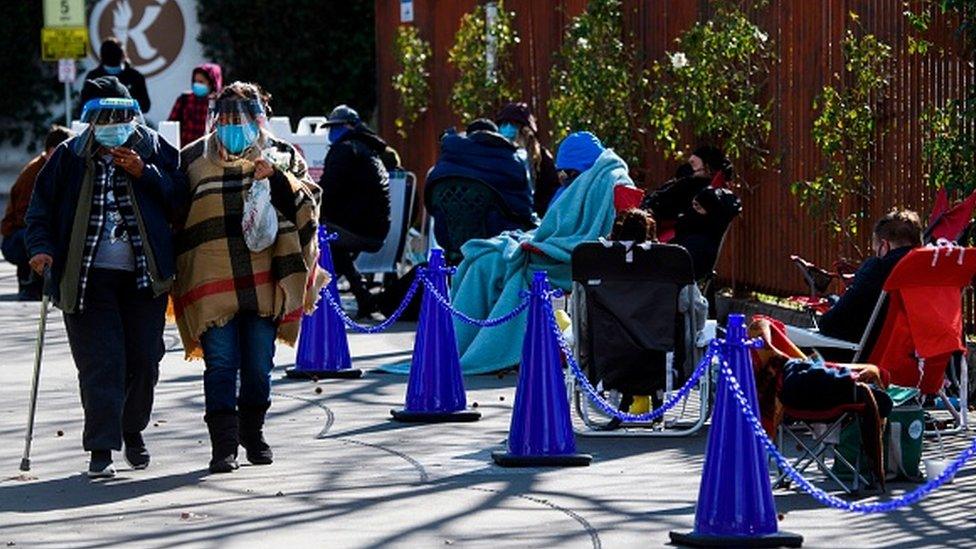
In the US, some people have been waiting in line for a chance to get a spare dose of a Covid-19 vaccination
At the moment, vaccines against the coronavirus are a finite resource.
Production of the few vaccines that have been approved by regulators is limited, with demand outstripping supply.
Supplies are running low in some high-income countries, putting pressure on manufacturers to step up production.
Meanwhile, almost all of the lowest-income countries - in Africa and elsewhere - have not even started giving vaccinations.
With coronavirus-linked deaths surpassing two million globally last week, the stakes of giving vaccinations to those that need them most could not be higher.
In most countries, health workers and the elderly are first in line, with few exceptions.
But there are some circumstances in which vaccine doses are available to young, less vulnerable people, regardless of their need.
These are leftover doses which, in the current climate, have raised questions about who should receive them, and how they should be allocated.
Why are there leftover vaccines?
A vaccine dose is left over when a patient who was scheduled to receive a jab fails to show up for their appointment.
That creates a dilemma, because vaccines have a limited shelf life.
For example, a vaccine made by Pfizer/BioNTech has to be injected within five days of the doses being thawed from sub-zero storage temperatures.
Otherwise, they go to waste, depriving someone of immunisation.
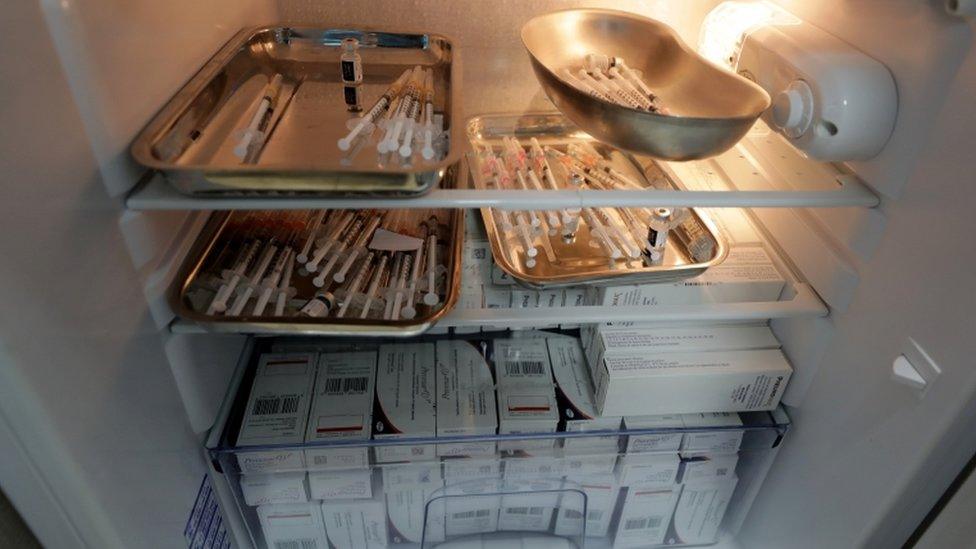
The vaccines are kept in a fridge until they are administered
So, when the clock is ticking, what can be done?
"If we're talking about the Pfizer vaccine that can't be stored for very long, then obviously a decision has to be made about that vaccine quite quickly, because it can't be kept," Professor Heather Draper of the Warwick Medical School told the BBC.
"It's better for anyone to be vaccinated, rather than no-one."
In other words, every vaccine counts, even if only a small number are left over.
Who are leftover vaccines being given to?
It depends on the circumstances. The guidance on this issue differs from country to country.
In the UK, eligible patients take priority, unless they do not show up for their vaccination.
In such instances, "the overriding principle will be to avoid wastage", so "vaccines may be administered to" health workers, the British Medical Association (BMA) says.
"All vaccination sites should have a reserve list so they can call people at short notice," Dr Richard Vautrey, chair of the BMA's GP Committee, told the BBC.
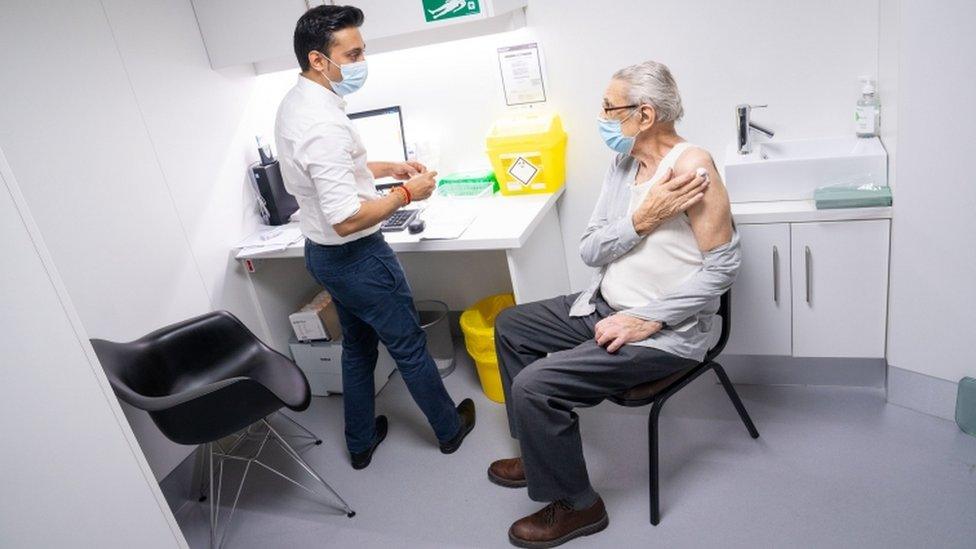
The elderly are a priority group to get vaccinations against Covid-19 in the UK
In other cases, vaccines have been given to people who just happened to be in the right place at the right time.
Conservative MP Brendan Clarke-Smith was a prominent example. In a Facebook post, Mr Clarke-Smith said he was given a jab after spending an afternoon volunteering at a vaccination centre.
Mr Clarke-Smith was accused of queue-jumping, but he defended his decision to accept the dose, arguing it would have gone to waste otherwise.
Allow Facebook content?
This article contains content provided by Facebook. We ask for your permission before anything is loaded, as they may be using cookies and other technologies. You may want to read Meta’s Facebook cookie policy, external and privacy policy, external before accepting. To view this content choose ‘accept and continue’.

Has this been happening in other countries?
Yes, to varying extents.
There was a similar situation in Austria, where local government officials have been accused of skipping the queue for Covid-19 vaccinations.
Wolfgang Matt, the 65-year-old mayor of Feldkirch, received a first jab of the Pfizer vaccine at a care home. He said it was a leftover dose, given to him when all priority candidates had been injected.
"I wouldn't throw out stale bread either but use it to make toast," he told the public broadcaster ORF.
Disputing this, a doctor at the care facility said: "There were so many people waiting outside who would have needed a vaccine more urgently."
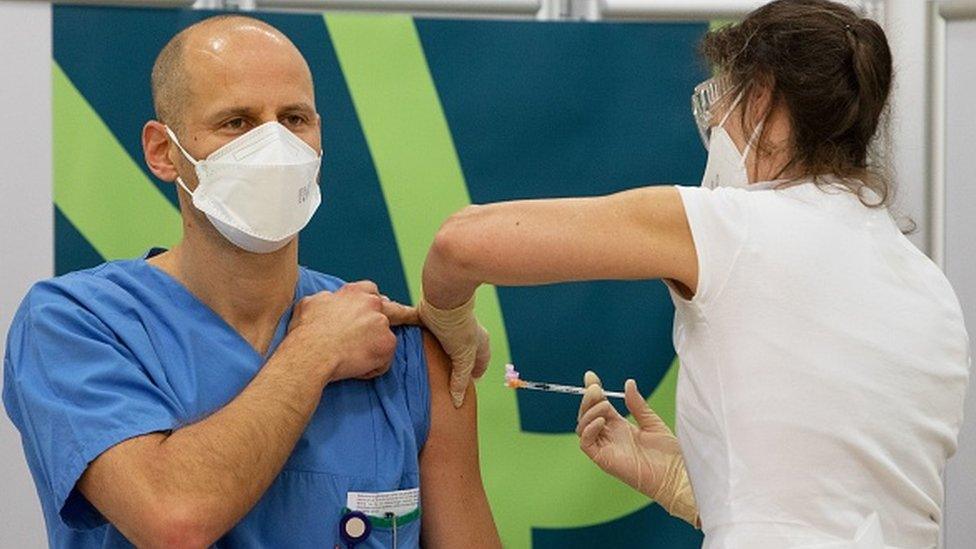
Health workers - like the one pictured here - are among the groups given priority in Austria
The pursuit of leftover doses has been no less controversial in the US, where the phrase "vaccine chasers" has become common parlance.
Across Los Angeles County, people of all ages have been queuing up for spare doses - in scenes more befitting of Glastonbury music festival than a vaccination centre.
Some have been camping out for hours, or coming back day after day equipped with sleeping bags, warm clothes and fold-up chairs.
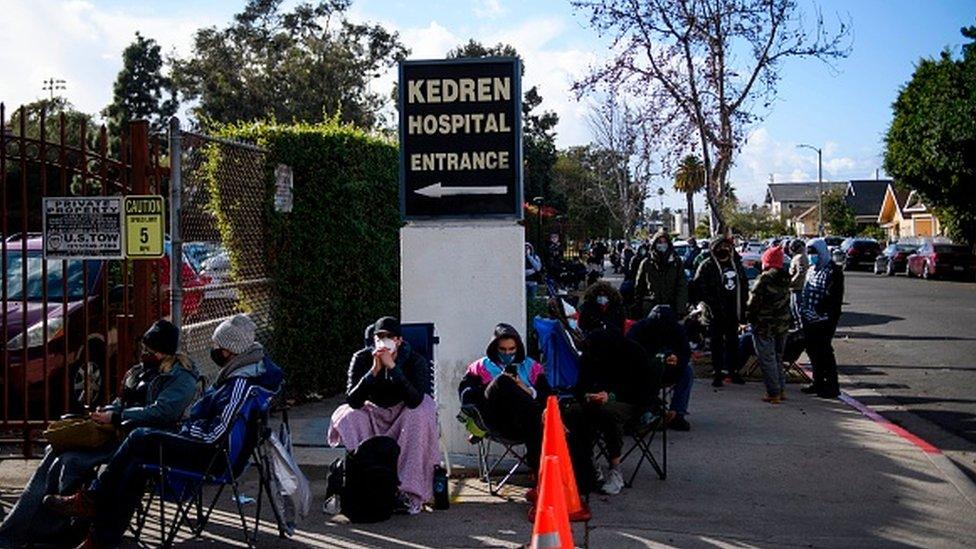
Queues have formed outside vaccination sites in Los Angeles in the US
"Just to have a chance at the vaccine, it would be life changing," Leah Robson, 27, told NBC Los Angeles, external outside a vaccine site.
"I'm glad they're prioritising older people, but if there's a chance I can get it, it's totally worth staying in line for all day."
For Ms Robson, there is no rush, it seems.
But sometimes, decisions about vaccinations need to be made more urgently.
Stuck in snow, health workers in Oregon were left with several vaccines that were close to expiring. Not wanting to waste them, staff walked from car to car, offering the vaccines to stranded drivers.
Allow Facebook content?
This article contains content provided by Facebook. We ask for your permission before anything is loaded, as they may be using cookies and other technologies. You may want to read Meta’s Facebook cookie policy, external and privacy policy, external before accepting. To view this content choose ‘accept and continue’.

The handout of leftover vaccines has been reported elsewhere as well.
In Israel, which has one of the highest vaccination rates in the world, there have been reports of younger people queueing up for end-of-day leftovers at vaccination centres.
A report by the Times of Israel newspaper, external said Israelis were discussing the best places to find spare shots in Facebook and WhatsApp groups.
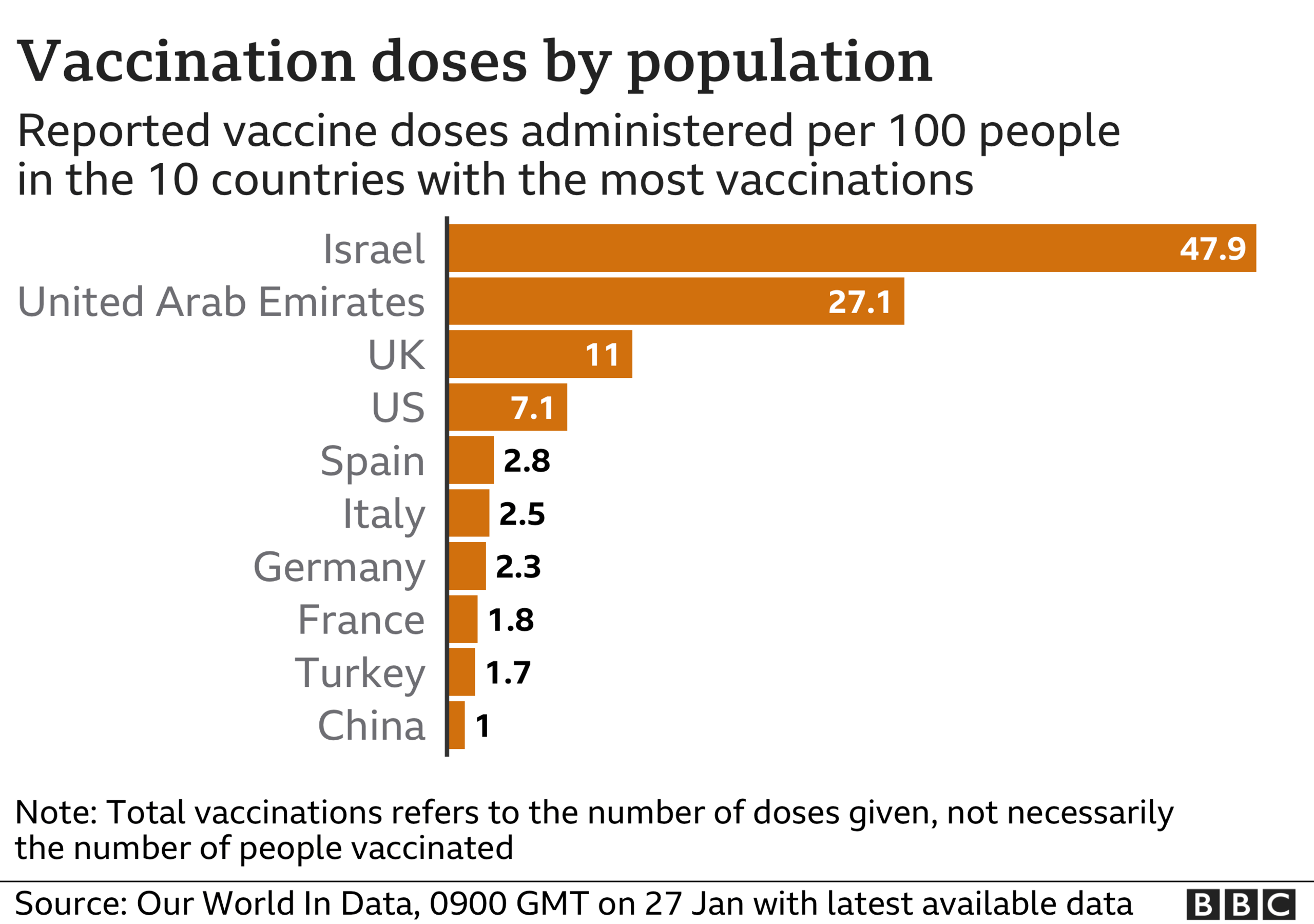

Are there problems with this practice?
This question was put to Dr Vautrey.
In exceptional circumstances, he said, there is nothing wrong with using leftover doses on people outside the priority groups.
"The cardinal rule is not to waste the vaccine," Dr Vautrey said.
"Ultimately, if there is absolutely nobody, and you're at the end of the day, then trying to find the next available person, who is the next highest priority, is better than wasting the vaccine."
WATCH: Pfizer v Oxford v Moderna – three Covid-19 vaccines compared
What about young, fit and healthy people who have gone out of their way to queue for spare vaccines, though?
Their actions, Professor Draper said, can only be judged if we know their motivations.
"Is it because you're frightened? Is it because you're vulnerable? Is your job making you vulnerable? Or is it because you're so extraordinarily wealthy, that you've got nothing better do to with your time?
"We'd need to know every person's motivation before we can say that simply willing to queue is a me-first cultural step," Professor Draper said.
Related topics
- Published28 January 2021
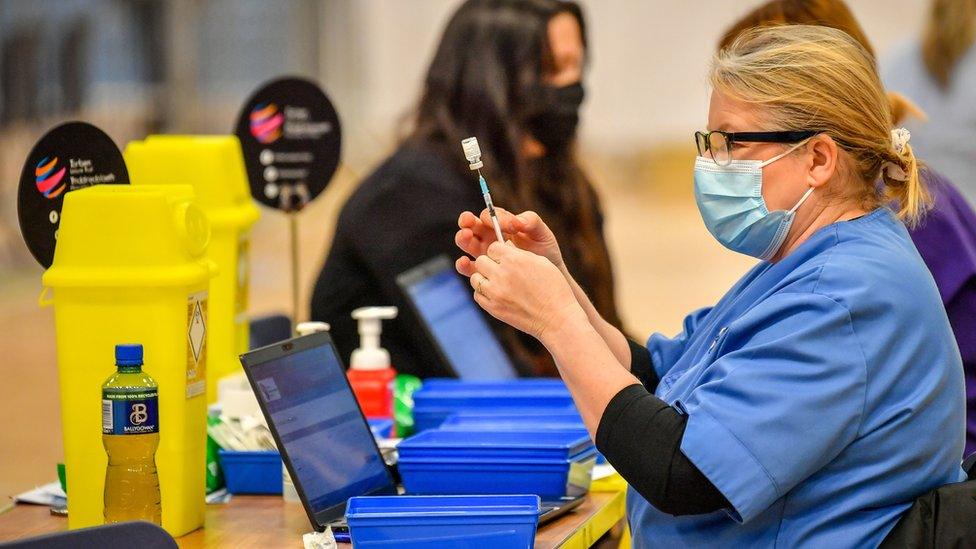
- Published28 January 2021
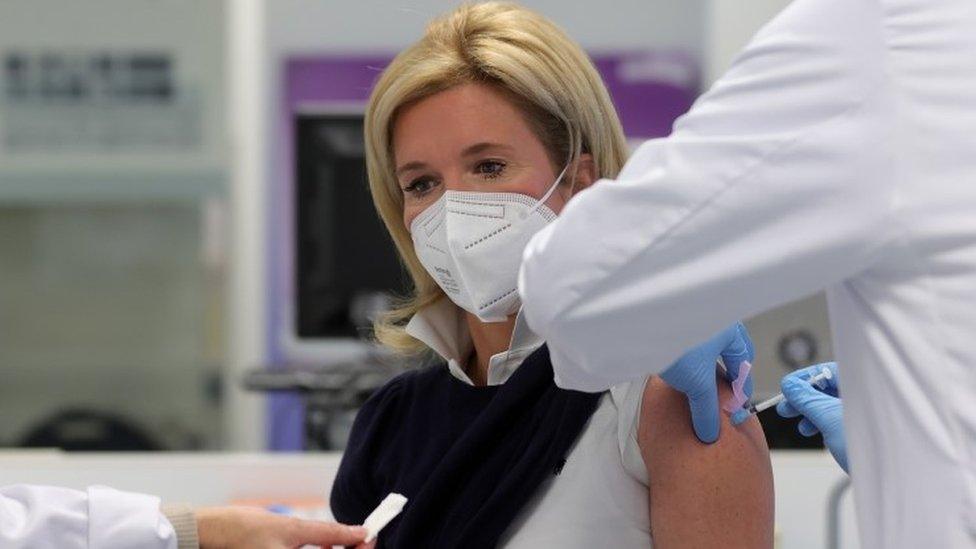
- Published2 April
